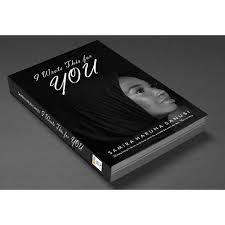 Samira Sanusi’s new poetry collection is a map of pain. Line after line, in her book I Wrote This For You (WRR/Authorpedia; 2017), the author traces a tough path through difficult memories like a hot iron through wax. It appears like an uncomfortable experience at first, one with a rebound of traumatic recollection. But what emerges, for sure, is triumph. Survival.
Samira Sanusi’s new poetry collection is a map of pain. Line after line, in her book I Wrote This For You (WRR/Authorpedia; 2017), the author traces a tough path through difficult memories like a hot iron through wax. It appears like an uncomfortable experience at first, one with a rebound of traumatic recollection. But what emerges, for sure, is triumph. Survival.
I first met Sanusi in Kaduna at the maiden edition of the Kaduna Book and Arts Festival (KABAFEST) where she was a guest on a panel discussing the issue of sickle cell anemia (full panel video here). She had written a book called S is for Survivor detailing the path of her healing from a sufferer and victim to a survivor and warrior. After many years of suffering through medical trials, twenty-eight surgeries, and other travails, she was finally healed when a bone marrow transplant turned her blood from a sickle cell blood to AA. She is now the President of the Samira Sanusi Sickle Cell Foundation (SSSCF), an Abuja based NGO.
Until then, I’d never heard of the idea of a blood transplant changing one’s genotype. But I haven’t followed the advances in medical science in this regard. So the revelation, as well as the heartbreaking tale of her survival, was both thrilling and heartwarming. I wanted to read her book. In this collection, Samira opens up in the best way she knows how: in words, mostly written to self, documenting the painful process of this journey to survival and all the attendant doubts, setbacks, despair, joy, and hope.
I finished reading this book a couple of weeks ago but I didn’t have the time to put down my thoughts about it, many of which I wrote down in a notebook I’ve now had to dig out from under a pile of other books. Here, a few of my favourite and memorable lines.
“That you have seen worse, doesn’t
mean the hell I’m seeing is a second-hand fire.
My worse is valid, even
when your bad is worse than mine.”
This came at the beginning of the book which – to my embarrassment – I’d initially assumed to be another prose work from the author. Nothing on the cover prepared the reader for poetry, so the words that came at me from the opening pages seemed, at first, like the preface to something else until they led one into each other throughout the book. It would appear that she had been documenting her thoughts and feelings about her pain and process throughout her encounter with the sickle cell trauma.
“Keep your truth away from me.
You don’t know what lies I have to tell myself
to sleep at night.”
 But don’t expect a clean arrangement either. The words flow into each other sometimes like aphorisms, separated by asterisks or other special characters. At other times, they appear as chapters carefully grouped together in a specified theme. But there were no chapters. Only verses. We walk through the lines as though experiencing the process and pain of the writer’s lived experiences.
But don’t expect a clean arrangement either. The words flow into each other sometimes like aphorisms, separated by asterisks or other special characters. At other times, they appear as chapters carefully grouped together in a specified theme. But there were no chapters. Only verses. We walk through the lines as though experiencing the process and pain of the writer’s lived experiences.
Who she was addressing wasn’t always obvious, but that was never a prerequisite to understanding or enjoying what was offered in the most private of words. In baring herself this way, the author invites us to see her not as a perfect survivor but one who had only persistently endured, with her head held up high, but with a few notable scars to show.
“She was so beautiful, the way
She kept people from falling into
Pieces as she broke apart.”
In the book are several themes which sometimes morph into each other, even in contrast. There is self-loving sometimes with self-loathing. There is gratitude as much as bewilderment, there is surrender and sometimes defiance.
“If you ask me about my dreams,
I would tell you to watch me,
for I am living them.”
Sometimes, she talks to herself, either in pity or in a berating tone.
“Looking into your eyes
I can tell you went to war
And did not come back with yourself.”
And sometimes with a challenge:
“You must come back to yourself
to find you waiting on the couch,
hoping to kiss and make up. Begging
for another chance at self-love.”
In other matters, she hints at love, lust, rejection, and romance:
“The first time he touched me
I yelled ‘Don’t hold my hand and don’t touch my heart!’
He asked, ‘Who happened to you?’
‘Your access pass to come in and save me so they can call you
Hero is rejected!”
Feminism? It sure seems so. Yet a certain religious conservatism also present underneath the soft and vulnerable persona the author presents in this book seems to sometimes intrude to confuse us as to whether the narrator is a helpless character in a patriarchal space or a defiant voice against it. Evidence of both can sometimes be found.
“Whose idea was it to look
at a boy’s eyes, filled with tears
and tell them men don’t cry?”
And on another…
“Dear Arewa woman
You’re not just somebody with a body
You’re body, mind, heart and soul
They’re all yours to share, as you please.”
I enjoyed reading the work in all its rollercoaster of emotions, aspirations, reflections, and ruminations.
Parts of the book do sometimes let go of its aspirations to poetry and spread out in plain prose, towards the end. But even in them are relevant nuggets of inspiration directed at an imagined audience of readers, and sometimes at the writer herself. The result is a book that both defies categorization as much as it defines it, expanding the possibilities for artistic self-reflection. I have not read many books of poetry from Northern Nigeria. But if Samira’s offering is any indication of what to expect when vulnerability and a questing mind meet at the junction of a page of poetry, then we are in for a good time.
The irony of enjoying work written in pain isn’t lost on the reader of course. But the writer never intended it as an invitation to pity. Rather, it is a celebration of triumph, survival. Each verse in the collection, whether intended to please, to stimulate, or to instruct, comes across in a form that also delights in soluble bites. I look forward to reading more from this author, this warrior, in whose survival we have also come to discover beauty, grace, and strength.
2 Comments to “I Wrote This For You”: Mapping Triumph in the Midst of Pain so far. (RSS Feeds for comments in this post)